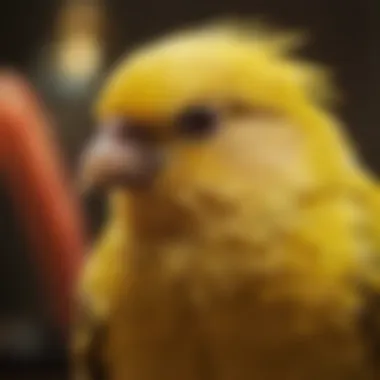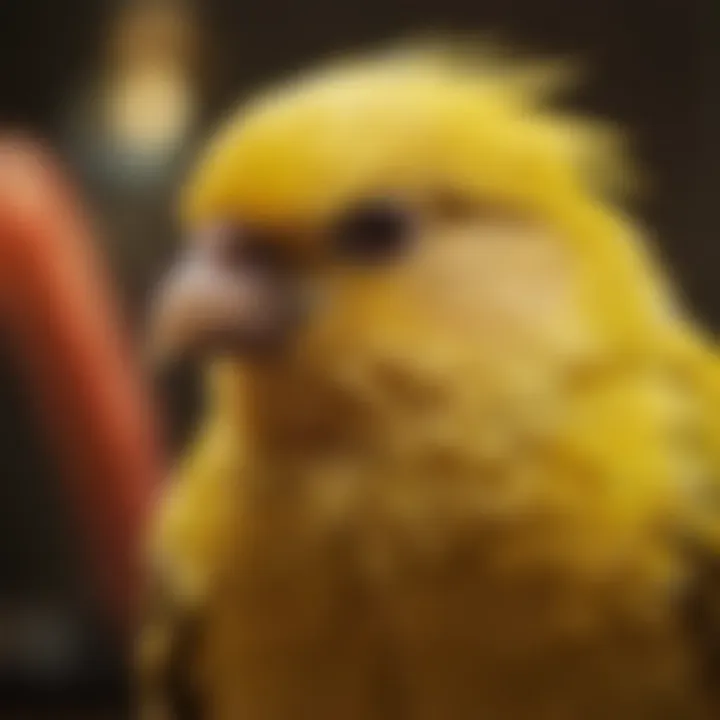Essential Guide to Caring for Your Pet Canary


Intro
Canaries are delightful little companions, known for their vibrant colors and melodic tunes. For many, these feathered friends brighten up a home and offer immense joy. Yet, caring for a canary is not merely about providing food and water. It requires a thorough understanding of their needs to ensure they thrive and flourish in your care. This guide aims to underscore the essentials of canary ownership, covering various aspects from diet and habitat to their emotional and physical well-being.
Now, grab your favorite drink and let's dive deep into the world of these charming songbirds.
Avian Care Basics
Importance of Proper Nutrition
Canaries need a balanced diet to keep them singing sweet tunes. A mix of high-quality seed, pellets, fresh fruits, and veggies is essential. Think of seeds as their bread and butter but remember to provide the extras for a richer diet. Items like spinach, carrots, and apples (just remove the seeds!) can introduce variety and nutrition.
Pro Tip: Avoid giving avocados and chocolate, as these can be toxic to birds.
Understanding Bird Species and Their Needs
While many pet parents think of canaries as a uniform group, there are several species, each with its quirks. The American Singer, for instance, is famed for its vocal prowess, while the Yorkshire canary is known for its regal appearance. Understanding the unique traits of your canary helps tailor their care.
Basics of Birds Habitat Setup
An inviting habitat sets the stage for your canary's happiness. The cage should be spacious, allowing your bird enough room to flutter about. Perches of different textures and diameters will keep their feet healthy and entertained. Don't forget about toys; a few simple hanging items can work wonders!
Key Considerations:
- Cage Size: Minimum of 18" x 18" x 24" for a single canary.
- Proper ventilation and safety from drafts are equally important.
Grooming and Hygiene Tips
Grooming isn’t just about looks; it’s vital for health. Regularly check your canary’s feathers and beak. A small, shallow dish of water can serve as a bathing spot, ensuring they stay clean and comfortable.
Remember: Clean the cage regularly to prevent buildup and potential health issues, as a clean home equals a happy bird.
Interacting with Your Pet Bird
Building Trust and Connection
Earning a canary’s trust is a gradual process. Start by spending time near their cage, talking softly, or even reading aloud. Your gentle presence will encourage them to warm up to you.
Training Techniques and Tips
Believe it or not, canaries can be trained! Using positive reinforcement works wonders. Offer a small treat when they exhibit desired behavior, like stepping onto your finger.
Start Small: Get them comfortable with your voice before introducing any new tricks.
Fun Activities for Bird Owners and Their Birds
Interactivity enhances bonds. Use foraging toys to stimulate their curiosity. You could also try moving their cage to different areas of your home. New sights can pique their interest.
Recognizing Bird Cues and Behaviors
Understanding canary body language is key. If they tilt their head or fluff their feathers, it may mean they are intrigued or content. A chirpy melody usually translates to happiness; however, sudden silence can be a sign of stress.
Emotional Well-Being of Birds
The Role of Play and Socialization
Canaries, like us, need leisure. Playing with toys or providing swings encourages physical activity. Their social nature also means they thrive on companionship, whether from their bird buddies or humans.
Enhancing Birds' Emotional Health
A calm environment is crucial. Avoid sudden loud noises or chaotic situations. Covering the cage with a light cloth during the night can help them rest better, contributing to emotional balance.
Assessing Bird Stress and Remedies
Watch for signs of stress, like excessive vocalization or feather plucking. If you notice these, something may be amiss. It could be their environment, diet, or companionship.
Building Strong Human-Bird Bonds
A robust bond cultivates trust and encourages interaction. Spend quality time with your canary daily, even if it’s just sitting together. They are social creatures and flourish in a loving home.
Bird Health and Safety


Common Health Issues and Prevention
Canaries can face health issues, like respiratory problems or beak deformities. Regular observation helps catch early signs. Ensuring fresh air and proper diet significantly aids in prevention.
Routine Veterinary Care
Consider scheduling annual check-ups with an avian vet. They can offer vaccinations and advice tailored to your canary’s specific needs.
Environmental Hazards to Avoid
Be aware of household hazards such as fumes from non-stick pans, cigarette smoke, and certain houseplants.
Important Reminder: Always research new items before introducing them to your pet’s space.
Signs of Illness or Distress
Keep an eye out for signs of distress: changes in eating habits, lethargy, or a fluffed-up appearance can indicate illness. Early intervention is crucial.
Fun Facts and Quirky Insights
Unique Traits of Popular Bird Species
Did you know that each canary has a unique song? Breeders have cable to amplify specific melodies. These traits give each bird its charm and personality.
Historical and Cultural Significance of Birds
Canaries have a rich history with miners, where they acted as early warning systems for dangerous gases. They also symbolize freedom and hope in various cultures.
Famous Bird Owners and Their Stories
Famed personalities, such as Franz Kafka and John Lennon, had a deep bond with their canaries. Their experiences reflect the emotional connections that can exist between humans and their avian counterparts.
This guide offers a foundational understanding of caring for your canary, ensuring both you and your feathered friend enjoy a life filled with laughter and song.
Prolusion to Canary Ownership
When deciding to bring a canary into your home, it’s crucial to understand that this choice goes beyond mere companionship. Canaries, with their lively personalities and melodious songs, are more than just pretty birds; they can become cherished members of your family. Recognizing the importance of canary ownership sets the foundation for a fulfilling relationship with these creatures.
Caring for canaries involves a blend of practical knowledge and emotional engagement. Understanding how to create a suitable environment and addressing their dietary needs is essential for their overall well-being. Additionally, owners must consider the social aspects of canaries, as these birds thrive on interaction and routine.
One significant benefit of canary ownership is the joy their songs can bring to your daily life. These birds are known for their bright, cheerful chirps and can even mimic sounds, turning your home into a lively environment. However, it’s essential to remember that canaries require attention and care, which includes regular cleaning, feeding, and providing mental stimulation.
Moreover, the commitment goes beyond just feeding and housing them. Owners must be aware of the different breeds, their unique behaviors, and health needs. It’s vital to create a nurturing environment that supports their natural instincts.
"Owning a pet canary isn't merely about having a bird in a cage; it's about enriching each other’s lives through trust and companionship."
In this guide, we will delve into what it really takes to be a responsible canary owner, covering everything from habitat selection to feeding practices. By the end, you will be well-equipped to ensure your canary flourishes in your care.
Choosing the Right Habitat
When it comes to keeping canaries, the environment you provide is crucial. A well-thought-out habitat acts as the foundation for both their physical health and emotional well-being. Think of it like the frame of a house; without a sturdy frame, everything else can falter. In this section, we’ll delve deeper into the specifics of creating a nurturing space for your feathered friends.
Selecting the Appropriate Cage Size
A common misconception is that any average birdcage will do, but that could not be further from the truth. The size of the cage is a key consideration. Canaries need room to flap their wings and move around; claustrophobic conditions can lead to stress and health issues. Generally, a cage that's at least 24 inches wide, 18 inches deep, and 24 inches high is ideal for a pair of canaries.
Why so roomy? Well, fully extended wings add up to a good portion of their comfort. A small cage can restrict natural behaviors, leading to frustration for your pet. In this regard, bigger isn’t just better; it’s necessary.
Essential Cage Accessories and Environment Setup
Creating a functional space is about adding the right accessories to complement the environment. Here's how to make that habitat truly habitable.
Perches and Their Importance
Perches are a must-have in any canary cage. They are not merely platforms but vital elements that contribute to your bird's overall health. Different types of perches provide varied surfaces and sizes, which mimic their natural habitat. For instance, natural wood perches allow for better grip and foot health. On the other hand, if you opt for plastic, be mindful it must allow for claw traction.
Utilizing multiple perches of different diameters can promote foot exercise and comfort, helping to prevent conditions like bumblefoot. Mix it up with some curved, straight, and even sanded options. The takeaway? Variety is key to encouraging your canary’s movement and strengthening its limbs.
Food and Water Containers
Every cage needs proper food and water containers. This might seem straightforward, but choosing the right kind can significantly influence your canary's health. Opt for heavier bowls that won’t tip over easily. Open containers can lead to food contamination from droppings, which isn't ideal. Instead, look for feeders designed for small birds; they generally have built-in mechanisms to reduce waste.
Furthermore, provide clean, fresh water daily. A water fountain can be an interesting alternative and helps keep the water cool. Remember, hydration plays a significant role in a bird’s overall health.


Hiding Spaces and Toys
Mental stimulation is crucial for canaries, and hiding spaces along with toys provide just that. Canaries are known explorers; giving them hiding spots encourages natural behavior. You can use items like small huts or even cardboard boxes to create cozy nooks.
Toys like bells or swings not only entertain but also stimulate physical activity. Agile little creatures need something to keep their minds sharp, and toys are a fantastic option. Plus, rotating toys can keep the environment fresh, sparking curiosity while staving off boredom.
Optimal Cage Placement in Your Home
Once you've got the cage set up, where do you put it? Ideal placement is crucial as well. Choose a spot away from drafts, direct sunlight, and bustling household activities. An area with natural daylight, without the intense blazing sun, is key. Some prefer to place the cage in a common room to interact more, whereas others might opt for a quieter locale to help minimize stress. Balancing social interaction with serenity can reap substantial rewards for your canary’s happiness.
Creating an optimal habitat isn’t just a task; it’s a commitment to your canary’s quality of life. Taking steps to enhance their environment will foster a lively spirit and undoubtedly lengthen their lifespan.
Feeding Your Canary
Feeding your canary is at the heart of keeping these lively companions healthy and happy. Proper nutrition ensures not only their physical well-being but also their emotional health. A well-fed canary is a content canary, singing sweetly and displaying lively behaviors. When you understand the nutritional needs of your pet, you set the stage for a long and fulfilling relationship. Let's break down the essentials.
Canary Diet Essentials
Seeds and Pellets
Seeds and pellets are the main staples in a canary's diet. These two sources provide essential vitamins and minerals that help maintain your canary's health. Seeds, such as millet, are favored by canaries for their taste, providing a good source of energy. They come in various mixes tailored for different canary breeds. However, seeds alone can't offer a complete diet due to their high fat content. Overindulgence can lead to obesity, a common concern among pet owners.
On the other hand, pellets have gained popularity among bird owners for their balanced nutrition. They combine grains, fruits, and veggies into a compact form. This eliminates the pecking order issues that arise with seeds. A significant advantage of pellets is that they contain controlled amounts of fat and nutrients, preventing selective eating habits in canaries. However, convinced or stubborn canaries might initially resist pellets, making the transition a challenge for some owners.
Fresh Fruits and Vegetables
Incorporating fresh fruits and vegetables into your canary’s diet widens their palate and adds essential nutrients. Fruits like apples, oranges, and berries provide antioxidants, while vegetables like kale, spinach, and carrots contribute vital vitamins such as A and C. Fresh produce promotes vibrant feathering and boosts their immune system.
One main consideration is to wash and chop these items into manageable sizes to avoid choking hazards. Remember that not all fruits and vegetables are safe; for example, avocado is toxic to birds. The beauty of offering fresh produce lies in the variety it brings, keeping meals stimulating while ensuring a well-rounded diet. However, fresh items should only accompany seeds or pellets and need to be removed if not consumed within a few hours to avoid spoilage.
Calcium and Supplements
Canaries also require calcium in their diets for strong bones and optimal metabolic functions. Providing cuttlebone or mineral blocks in their cage ensures they can access this essential mineral at all times. It's vital to note that in the breeding season, females require additional calcium to support egg production. Aside from calcium, supplements such as vitamins D and E can further enhance their diet, especially if you notice signs of deficiency.
Using supplements can be beneficial as a safety net. However, it’s important not to overdo it. Too much supplementation can lead to imbalances that may harm your bird. Researching or consulting a veterinarian can help you find the right balance for your specific canary.
Feeding Schedule and Portion Control
Figuring out a feeding schedule for your canary can be as simple as setting a daily routine. Canaries thrive on routine, so they benefit from being fed at the same times each day. A good practice is to offer their main meal in the morning and a smaller amount in the evening. Portion control is crucial; consider giving them a quarter to half a teaspoon of seeds or pellets for each meal, adjusting based on their needs and activity levels.
Watering Your Canary
Just like food, access to fresh water is of utmost importance. Canaries tend to drink throughout the day, so a daily check of their water supply is necessary. Providing clean, fresh water daily can greatly impact their health. Avoid using tap water if you know it has high mineral content, as this can lead to health issues over time. Instead, opting for filtered or bottled water is a safer choice.
Water bowls should be cleaned regularly to prevent contamination. Consider using water bottles designed for birds, which keep the water cleaner for longer and reduce spillage.
Socialization and Behavioral Insights
Understanding how canaries behave and interact is essential for fostering a healthy pet relationship. Unlike many pets that thrive on physical interaction, canaries are often more nuanced in their social needs. They might not need constant handling but will benefit from an enriching environment that caters to their instinctual behaviors. Socialization, in this context, focuses on how they interact with humans and their environment. When owners take the time to observe and understand their canaries, it leads to mutual trust and a genuine bond that can enhance the overall living experience.
Understanding Canary Behavior
Canaries are not just beautiful birds with melodious songs; they are creatures with a range of behaviors that express their emotions and well-being. In the wild, they would flock with other canaries, teaching them to be sociable. When they are kept alone, it’s crucial that owners understand the slight cues their feathered friends offer. For instance, a canary that sings might not only be happily expressing itself; it could also be signaling its readiness to mate or indicating discomfort from loneliness. Understanding these behaviors is pivotal.
Creating a Stimulating Environment
Creating an engaging environment for canaries goes beyond just providing food and water. It’s about crafting a habitat that actively stimulates their senses and nurtures their instincts.
Types of Toys and Interactions
Toys play a significant role in keeping canaries mentally stimulated. Specifically designed toys, like swings, ladders, and puzzle toys, can help satisfy natural instincts to explore and play. Parrots are often known for their intelligence, but canaries are no slouches either. They enjoy solving simple problems to get to a reward. A well-chosen toy can keep them engaged for hours. However, it’s important to rotate toys regularly. Birds can quickly lose interest in toys that become too familiar and can even become bored, leading to stress.
- Key Characteristics: Canaries favor toys that mimic their natural environment.
- Unique Features: Puzzle toys challenge their problem-solving abilities.
- Advantages: Keeps canaries active and reduces potential behavioral issues due to boredom.
Songbird Behavior and Duets
Canaries are known for their unique song patterns, often used to communicate with one another. These songs can be a form of expression or simply a method of establishing territory. Canaries can form specific bonds, sometimes dueting with a mate or mimicking their owner’s voice. Recognizing your canary's song can be quite rewarding. Listening closely helps owners understand their needs or feelings, whether to signal cheerfulness or unease.
- Key Characteristic: Males are often the more vocal ones, singing to attract females.
- Unique Feature: Duets can flourish when a bonded pair is kept together.
- Advantages: Engaging with canaries during their singing can strengthen your bond.
Handling and Training Basics


Training a canary doesn’t have to be complicated. It revolves around gentle handling and simple commands, fostering trust and affection. Due to their delicate nature, handling should be approached with care. Allow the bird to come onto your hand willingly rather than forcing interaction. Gradual training techniques can include clicker training, which teaches them to associate sounds with actions or treats; thus, making the learning process enjoyable for both the bird and the owner.
- Key Characteristics: Trust must be built progressively.
- Unique Feature: Clicker training helps establish communication.
- Advantages: This approach not only promotes bonding but also establishes a foundation for good behavior in canaries.
Health and Maintenance
Caring for canaries means paying close attention to their health and maintenance. Without proper care, even the most vibrant canary can fall victim to various health issues. Maintaining a regular check-up routine is not just a good practice; it is crucial for ensuring the longevity and well-being of your feathered friends. This section explores common health concerns, how to recognize the signs of illness, and the importance of routine veterinary care.
Common Health Issues in Canaries
Canaries, like any other pets, are prone to certain health problems. Some key issues that can arise include:
- Ear and Respiratory Infections: Canaries can develop infections caused by bacteria or viruses. Poor hygiene, drafts, and high humidity can exacerbate these infections.
- Feather Plucking and Molting Stress: While molting is natural, excessive plucking can be a sign of stress or dietary deficiencies. A bird’s feathers are essential for insulation and appearance, so dealing with plucking is necessary.
- Obesity: A common issue especially in canaries that aren’t as active. An improper diet rich in seeds with no balance of greens can lead to excessive weight.
- Parasites: External parasites like mites and internal parasites such as worms can affect a canary's health severely, making it vital to keep an eye out for infestation.
Maintaining the right environment, along with a balanced diet, goes a long way in mitigating these health issues. Regular monitoring can help catch problems early before they escalate.
Recognizing Signs of Illness
Being attentive to your canary's behavior can help you spot potential health problems early on. Some signs to keep a lookout for include:
- Change in Vocalization: If your canary, known for its sweet songs, goes silent or changes its usual tune, something might be amiss.
- Fluffed Feathers: Birds fluff up their feathers to keep warm, but if your canary stays fluffed for a prolonged period, it could indicate illness.
- Lethargy: A sudden drop in activity levels or disinterest in play can be a telltale sign of sickness.
- Changes in Eating Habits: If your canary suddenly eats less or refuses food, it’s time to investigate.
- Abnormal Droppings: The droppings of a sick canary may look different from normal, signaling dietary issues or infections.
Make it a habit to observe your canary closely. An attentive eye can make a significant difference in their health.
Routine Veterinary Care and Health Checkups
Regular veterinary checkups should be part of your routine to ensure your canary stays in top shape. Unlike cats or dogs, canaries often struggle to show their discomfort; thus, a vet’s trained eyes can catch issues that may be invisible to an owner.
During routine checks, the vet will usually:
- Examine General Health: They will assess the canary’s weight and look for any signs of distress.
- Conduct Blood Tests: These tests can identify potential issues early, allowing for timely intervention.
- Check for Parasites: The vet will look for both internal and external parasites that could compromise your canary's health.
- Evaluate Diet: A discussion about diet can help you ensure your bird gets the nutrients it needs.
Regular veterinary care is essential for a canary's well-being. Neglecting this can lead to bigger problems down the road.
Overall, maintaining a proactive approach towards health and maintenance not only helps prevent illnesses but also fosters a stronger bond between you and your canary. The attention you pay now can lead to happy chirps and vibrant colors in the long run.
Understanding Emotional Bonds
Caring for a canary goes beyond the practical aspects of feeding and cleaning their cages. Emotional bonds play a significant role in how both the bird and owner experience this unique companionship. A healthy relationship between a pet and its owner can improve the bird’s stress levels, foster better health, and generally create a more enjoyable living environment. Here, we delve into the importance of these emotional connections and how they can be nurtured.
The Role of Interaction in Canaries' Well-being
Interactivity can make all the difference when it comes to the happiness of your canary. By engaging with your feathered friend through various activities, you're not merely providing companionship; you are significantly contributing to their mental health.
- Daily Interaction: Spend time talking to your canary. Regular interaction can lead to your bird recognizing your voice and even developing a form of communication with you. Over time, this can translate to a stronger bond.
- Playtime: Offering toys that encourage physical activity can keep your canary entertained while promoting their well-being. Swinging perches, mirrors, and chew toys are just a few options that prompt playfulness.
- Training: Believe it or not, you can train canaries! Simple commands can be established, and positive reinforcement can lead to a more trusting relationship. Giving your canary treats when they perch on your finger can create a sense of closeness.
Incorporating these interactive elements nurtures an atmosphere of trust and minimizes undue stress for the bird. Remember, a content canary will often display lively behavior, sing beautifully, and be more socially engaged.
Recognizing Your Canary’s Affection
Identifying forms of affection in your canary isn’t just about watching for physical signs. It involves understanding their unique personality and how they express themselves.
- Vocalizations: A happy canary often sings melodiously, especially in the presence of someone they trust. Pay attention to variations in their songs, as these can display different moods.
- Preening: When a canary preens near you, it's a way of engaging and indicating comfort. They clean their feathers to maintain their appearance, but doing this around you signifies some level of trust.
- Curiosity and Approach: If your canary is keen on checking out your presence, it’s a good indication they feel secure and curious. Conversely, if they hide away, you may need to adjust the environment or your interaction techniques.
- Body Language: Canaries exhibit affection through posture too. A relaxed bird with feathers fluffed up and a wiggly stance usually indicates a positive mood.
In summary, recognizing the signs of affection from your canary allows you to tailor your interactions, thereby deepening the emotional bond. This awareness not only enriches the relationship but is also essential for their overall wellness and happiness.
Building a strong emotional connection with your canary fosters trust and enhances the quality of their life.
Finale and Final Thoughts
Caring for canaries as pets is not just a hobby; it’s an endearing responsibility that brings joy and companionship. This article underscores the vital aspects of canary ownership, from understanding their needs to creating a nurturing environment. Recognizing the significance of each element discussed is essential.
Canaries thrive when their habitats are thoughtfully arranged, dietary needs met, and emotional bonds nurtured. With the right approach, owners can find themselves not merely caring for a pet but engaging in a mutually enriching experience.
Summarizing Key Points
Let’s recap the salient points:
- Understanding Canaries as Companions: These birds are more than just eye candy; they can form deep emotional connections with their owners. Through interaction, their happiness blooms.
- Cage Setup and Resources: A well-selected cage, complete with perch variety and cleaning supplies, plays a critical role in keeping canaries healthy and active. Everything from the layout to the accessories matter in fostering a suitable environment.
- Nutrition: A balanced diet consisting of seeds, fresh fruits, and necessary supplements goes a long way in ensuring your canary is fit and ready to sing its heart out.
- Social Interaction: Regular interaction and training can deepen your relationship with your canary, allowing you to recognize their moods, likes, and dislikes more easily. The nuances of their behavior require attentive observation.
- Health Maintenance: Regular vet check-ups aren't optional but essential. Early detection of health issues can save your feathered friend from unnecessary suffering.
"An ounce of prevention is worth a pound of cure.” This saying rings true for the well-being of canaries. Keeping an eye on their health and behavior is a proactive measure that carries significant weight.
Encouragement for Ongoing Learning
Bird care is a journey, not a destination. One must always be willing to learn and adapt. The knowledge you gain does not end here. Delve into resources like Wikipedia, and Britannica to deepen your understanding. Furthermore, online communities such as Reddit or even Facebook groups dedicated to bird ownership can provide invaluable support and insights.
Stay informed about new research, nutrition updates, and tips for behavioral training. The world of pet birds is evolving, and staying current will benefit both you and your canary.
Remember, the journey with your canary is one of joy, learning, and growth. Every chirp, flutter, and glance offers a chance to strengthen your bond, so embrace it wholeheartedly.















